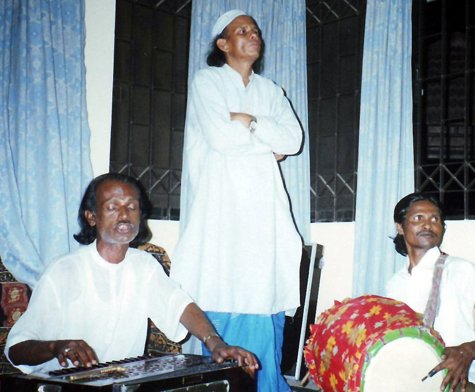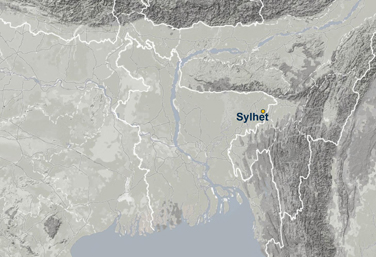Sylhet, Bangladesh. 20-21 April 2006. Ruhi Thakur and others
Ruhitaswar Chakraborty, popularly known as Ruhi Thakur, a man who left such an indelible mark on us with his songs. Perhaps because he would be gone within a year of this recording? At the time of his death from cancer Ruhida was hardly in his mid-50s.
A day before this recording session we had seen him for the first time, at a meeting of bauls in Sylhet town (interestingly, baul here does not suggest any particular esoteric practice such as in Kenduli or Kushtia. But baul means those who sing mystical poetry; devotional songs, Sufi or Bhakti or both. Those who take on this singing as a way of life and also sing for a living). This was a time of political unrest and increasing fundamentalist pressures in Bangladesh and people in the practice of such music—the bauls and boyatis (these labels are also often interchangeable)—were under threat of being silenced. Ruhi Thakur, Chandan Miah, Birohi Kala Miah, Abdul Hamid and others were thus meeting to discuss how they could fight the system and continue to sing.

Ruhi Thakur & Others
Ruhi Thakur was wearing an embroidered synthetic kurta with a shine, hair up to his neck oiled and neatly combed. We had not heard him before, hence did not know what to expect. After the meeting we all went to Abdul Hamid’s home, where I had had been during my first trip alone, two years ago. This was my second visit. When Ruhi Thakur started to sing, we were speechless. Sukanta and I just exchanged glances. He sang the 19th century mystic poet Radharaman’s bichchhed or song of separation with such tenderness: Shyam kaliya shona bondhu re, ami nirole tumare pailam na (I didn’t get to be with you alone, my sweet friend, my Shyam Kaliya/I never could tell you what aches my heart).
Our second session with him was in the house of our friend and guide in Sylhet, Ambarish Dutta. Ambarishda was hosting an ashor (home concert), as he has so generously done over the years. Many of the finest folk singers of Sylhet—people we were looking to record—were present. Chandrabati Barman, the septuagenarian singer of women’s songs and bichchhed, deeply respected and loved by everyone present, was the star attraction of course. We had only just met her and were completely overwhelmed. Then there were Ruhi Thakur, Abdul Hamid Jalali, Chandan Miah and Rehana–who would belong to the broad category of ‘baul’ in Sylhet, who sing mainly in shrines and melas, in open air concerts, before of vast audiences. There were also Himangshu Biswas and Krishno, more urban and middle class, the former also a singer of Bangla art song and adhunik. The audience comprised mainly middle class professionals, who turned out to be the keenest listeners–real roshik or connoisseur. A song comes alive not only through the singing but also by listening. Amare keu chhuiyo na go sajani is an extremely popular composition of the folk poet of Sylhet, Shah Abdul Korim, who was still alive at the time, at 92. We can hear in this recording the shared pleasure of the singer and the listener. We can hear people rejoicing in the song, clapping and singing along. The living room of a banker’s apartment had transformed into the space of a mela.
The other song selected here conveys the same kind of pleasure, Surodhunir kinaray shonar nupur ranga paye. Gouranga or Sri Chaitanya Mahaprabhu, the Glowing One, the ultimate devotee of Lord Krishna, goes singing and dancing, leading the band of devotees along the bank of the holy river of Surodhuni (Ganga). Four years later, in 2010, Ruhi Thakur’s brother, Ranesh Thakur, sang this song at our own Baul Fakir Utsav in Shaktigarh, Kolkata, when a team of musicians from Sylhet came to take part in the festival. From that video, you will get a sense of the communal spirit of such performances.
Written in 2010, edited 2020.
- Saptiguri, North Bengal. 27 November 2003. Nirmala Roy
- Bolpur, Birbhum. 25 November 2003. Nimai Chand Baul
- Kolkata. 4 September 2019. Purnadas on Nabani Das Baul
- Surma News Office, Quaker Street, East London. 27 February 2007. Ahmed Moyez
- Ambikapur, Faridpur, Bangladesh. 29 April 2006. Hajera Bibi
- Sylhet, Bangladesh. 22 April 2006. Chandrabati Roy Barman and Sushoma Das
- Sylhet, Bangladesh. 21 April 2006. Arkum Shah Mazar
- Jahajpur, Purulia. 27 February 2006. Naren Hansda and others
- Faridpur, Bangladesh. 24 January 2006. Binoy Nath
- Uttar Shobharampur, Faridpur, Bangladesh. 22 January 2006. Ibrahim Boyati
- Baotipara, Faridpur, Bangladesh. 21 January 2006. Kusumbala Mondal and others
- Kumar Nodi, Faridpur, Bangladesh. 21 January 2006. Idris Majhi and Sadek Ali
- Debicharan, Rangpur, Bangladesh 18 January 2006 Anurupa Roy & Mini Roy, Shopon Das
- Mahiganj, Rangpur, Bangladesh. 17 January 2006. Biswanath Mahanta & Digen Roy
- Chitarpur, Kotshila, Purulia. 28 November 2005. Musurabala
- Krishnai, Goalpara, Assam. 30 August 2005. Rahima Kolita
- Chandrapur,Cachar. 28 August 2005. Janmashtami
- Silchar, 25 August 2005, Barindra Das
- Kenduli,Birbhum. 14 January 2005. Fulmala Dasi
- Kenduli, Birbhum. 13 January 2005. Ashalata Mandal
- Shaspur, Birbhum. 8 January 2005. Golam Shah and sons Salam and Jamir
- Bhaddi, Purulia. 6 January 2005. Amulya Kumar, Hari Kumar
- Srimangal, Sylhet. 27 December 2004. Tea garden singers
- Sylhet, Bangladesh. 26 December 2004. Abdul Hamid
- Dhaka, Bangladesh. 24 December 2004. Ali Akbar
- Dhaka, Bangladesh. 23 December 2004. Monjila
- Changrabandha, Coochbehar. 16 December 2004. Abhay Roy
- Santiniketan, Birbhum 27 Nov 2004 Debdas Baul, Nandarani
- Tarapith, Birbhum. 14 October 2004. Kanai Das Baul


